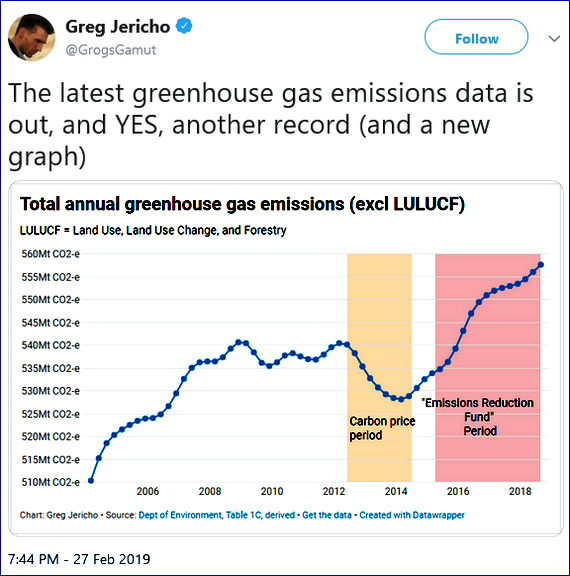The energy minister repeats PM’s line that emissions fell by 1% when the government’s own figures show the opposite
 |
| Angus Taylor repeatedly stated emissions had decreased by 1% in an interview on the ABC’s Insiders program. Photograph: Lukas Coch/AAP |
In an interview with the ABC program Insiders, Angus Taylor repeatedly stated emissions had decreased by 1% repeating the line first said by the prime minister, Scott Morrison, that Australia would meet it’s Paris commitments in “a canter”.
“Yes, they’re coming down and the department rightly believes they’re going to continue to go down and the result of this is we will reach, not just our Kyoto targets and still in the Kyoto period, we will reach our Paris targets,” he said.
The latest report released by the environment department, looking at emissions between September 2017 and September 2018, showed total emissions in Australia had increased by 0.9%, continuing a pattern of increases over the past five years.
That rise in emissions was largely due to an increase in liquid natural gas exports, but other sectors, including stationary energy, transport and waste sectors also contributed.
The last substantial fall in Australian emissions occurred after the Gillard government put a price on carbon, which was immediately derided as a “carbon tax” by the Abbott opposition, a claim Tony Abbott’s chief advisor, Peta Credlin later admitted was not true and was just “brutal retail politics” which won Abbott the election.
Since then, the Coalition has struggled to settle on an energy policy, with its most serious attempt, the national energy guarantee, leading to the demise of Malcolm Turnbull’s prime ministership.
Under pressure from moderates and the electoral reality the Coalition needs to hold on to its inner city ‘small l Liberal’ seats if it is to have a chance at retaining power, Morrison unveiled a new energy policy late last month, announcing what amounts to a reboot of Tony Abbott’s Direct Action policy.
The emissions reduction fund only amounts to $200m a year. With the election less than three months away, the government has officially signed off on the expansion of the Snowy hydro-project, which began under Turnbull’s leadership, and committed at least $56m to the construction of the Marinus link, the so-called “battery of the nation” project, which would send Tasmania’s renewable power to the mainland.
However a feasibility study into the success of the Tasmanian interconnector project made it clear that its benefits would be realised “when approximately 7,000MW of the national electricity market’s present coal-fired generation capacity retires”, which would mean accelerating the removal of coal from the system.
“The largest single influencing factor in the economic feasibility and timing of Marinus Link is the trajectory of coal-fired generation retirement in the national electricity market,” the feasibility report concluded.
The government has not ruled out underwriting coal-fired generation projects in the future, with resources minister Matt Canavan admitting last week to Sky News the number was “around 10”, after Taylor repeatedly declined to put a figure on it.
But to underwrite coal-generation projects, while supporting the Tasmanian ‘battery of the nation’ project, the success of which relies on the removal of coal from the system, would establish a situation where the government was competing with itself, potentially making one project un-viable.
In his Sunday interview, Taylor still declined to put a figure on how many coal projects the government was considering underwriting, stating “I’m the energy minister, I am not going to commit to a number here and now”, but he said more competition was good, despite the contradiction in projects.
“You put your finger on it – we want more competition,” he said.
“We want more competition, not less. And if what we’re doing with Snowy 2.0 and what we’re doing with battery of the nation and what we’re doing with underwriting results in more competition against ourselves, as you put it, that is a great thing because the result of that is lower prices, keeping the lights on and avoiding the situation we had in Victoria in January – 200,000 houses lost their lights.
“Portland Aluminium smelter had to go off-line. If the battery of the nation had been up and running when that happened, it wouldn’t have happened.
“We got to address this. It is urgent. That’s why we’re doing it a number of ways. It will result in more supply, it will result in more competition as you rightly point out and that will drive down prices.”
Links
- Coalition is struggling to handle the heat of its own bonfire
- Australia's greenhouse gas emissions continue to rise
- Scott Morrison to reboot Tony Abbott's emissions reduction fund with $2bn
- Australia’s carbon emissions highest on record, data shows
- Instead of 'fair dinkum' power, how about some 'fair dinkum' action?
- PM claims Australia will meet Paris target 'in a canter' despite emissions climbing
- Australia's greenhouse gas emissions highest on record
- Australia's greenhouse gas emissions are rising and forecast to miss 2030 target


No comments :
Post a Comment